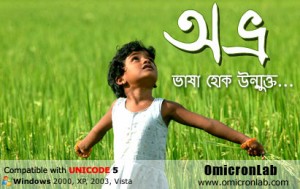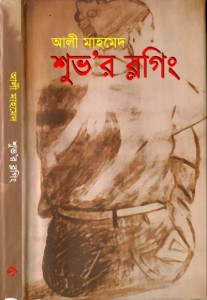The Bangla blogosphere and Bangladeshi Facebook users are infuriated with protests as '
Avro', a freeware and one of the popular and widely used Bangla input systems, was accused as a pirated version of another popular Bangla input system '
Bijoy' and the Avro team was mentioned as hackers.
In an article in a Bangla news daily, Mustafa Jabbar, the proprietor of Bijoy and a pioneer of Bangla computing said hackers were responsible for spreading pirated copies of his Bijoy software on the internet. He also said that UNDP had helped these hackers to be selected by the Bangladesh Election commission for their national database works.
It may be mentioned here that Bangladesh saw
more than 20 proprietary Bangla input software from 1984 to 2002 and the most popular of them was Mustafa Jabbar's Bijoy during those days. Many developers worked on its various versions.
But the real boost in Bangla computing came when in 2003
Mehdi Hasan, a Bangladeshi medical student developed
Avro, a free but closed source graphic keyboard layout changer, using
Unicode which was further developed during last six years by Mehdi and his friends Rifatunnabi, Tanvin Islam Siam, Ryan Kamal, Shabab Mustafa and Nipun Haq.


While Bijoy is a ASCII based proprietary Bangla input system software and is sold in exchange of license fees, Avro on the other hand is an Unicode based freeware which has in fact four input system with four keyboard layouts - Avro Phonetic, Bornona, National (Jatiyo) and UniBijoy. The Avro phonetic (or transliteration) input system is the most popular and widely used - especially by the diaspora who do not have access to a physical Bangla keyboard. Using the Avro phonetic
transliteration system they can generate Bangla words from Roman typefaces with ease.
After the accusations of Mr. Jabbar the Bangla blogosphere reacted swiftly.
Loken Bosh in
Amar Bondhu blog
challenged Mr. Jabbar to prove that Avro is a pirated software. He wrote:
কম্পিউটারে বাংলা লেখায় বিজয় মাইল ফলক হয়ে এসেছিলো। বিজয়ের অবদানকে অস্বীকার করার কিছু নেই। এখনো প্রফেশনাল প্রিন্টিংয়ের কাজে বিজয়ের বিকল্প নেই।
কিন্তু ইন্টারনেটের এই প্রসারের যুগে বিজয় ধীরে ধীরে অকেজো হয়ে যাচ্ছে। [..] তাই নতুন সময়ের দাবীতেই এলো অভ্র। মেহদী হাসান খান নামের এক তরুণ সম্পূর্ণ ব্যক্তিগত উদ্যোগে তৈরি করলেন অভ্র নামক একটি সফটওয়্যার। এবং যা তিনি বিনামূল্যে ছড়িয়ে দিলেন সমস্ত বিশ্বে। যে কেউ চাইলেই এই সফটওয়্যার ইন্টারনেট থেকে ডাউনলোড করে ব্যবহার করতে পারবেন।
অভ্রর জনপ্রিয়তা এখন আকাশচুম্বী। ধীরে ধীরে শুরু হয়ে গেছে বিজয় বর্জন। [..] মোস্তফা জব্বার শঙ্কিত। তাই এই মিথ্যাচার। নির্বাচন কমিশন যখন ভোটার আইডির কাজে বিজয় না ব্যবহার করে অভ্র ব্যবহার করলো, তখনই তার গাত্রদাহ প্রবল হয়েছিলো। [..] আর পাশাপাশি নিজের খ্যাতিকে কাজে লাগিয়ে চালিয়ে যাচ্ছেন অভ্রর বিরুদ্ধে মিথ্যাচার। আর এই করে করে তিনি নিজেই নিজেকে হাস্যকর প্রমাণ করছেন, আমাদের যেখানে উনাকে শ্রদ্ধা করার কথা ছিলো, সেখানে এখন তার প্রতি ঘৃণা তৈরি হচ্ছে।
Bijoy was a milestone for Bangla Computing. There is nothing to belittle Bijoy's contribution. Even today there is no option for Bijoy in the print industry (Unicode Bangla is not supported in Photoshop).
But in this era of Internet Bijoy is lagging behind. [..] So Avro came with a promise. A young man named Mehdi Hasan created Avro on his own. And he spread it across the globe via internet. Anyone can download the software and use it (for free).
The popularity of Avro is now sky high. Many people are not using Bijoy anymore. [..] Mustafa Jabbar is afraid. When the Election commission chose Avro instead of Bijoy for their voter ID project, he was infuriated with Avro. [..] So he is using his popularity to spread allegations against Avro. And he has created himself a laughing stock. Where we were supposed to revere him, hatred against him is being generated.
Avronil informs in Sachalayatan:
বাংলাদেশের ইতিহাসে এই পর্যন্ত বাংলায় ডিজিটাল তথ্য সংগ্রহের সব চাইতে বড় প্রকল্প 'ভোটার তালিকা ও জাতীয় পরিচয়পত্র প্রস্তুতকরণ' প্রকল্পে অভ্র ব্যবহার করা হয়েছিল। তাদের প্রথম পছন্দ বিজয় হলেও বিজয়ের প্রস্তুতকারক কম্পানি বিজয়ের জন্য কম্পিউটার প্রতি পাঁচ হাজার টাকা লাইসেন্স ফি চেয়েছিল যা পরে বাতিল করে দিয়ে অভ্র ব্যবহারের সিদ্ধান্ত নেয়া হয়। এ জন্য নির্বাচন কমিশনের অভ্রকে দেয়া একটা স্বীকৃতিমুলক সনদের জন্য একটা কাগজ আর সামান্য কালি ছাড়া আর কিছুই খরচ করতে হয় নি।
The Voter ID and National ID project, the largest digital database project in Bangladesh's history, used Avro. Their first choice was Bijoy, but its proprietor company asked Taka 5000 (US$70) license fee for each computer, so they have decided to use Avro instead. In return they only had to give a certificate to Avro.
The claim of Mr. Jabbar is that UniBijoy keyboard system, one of the four keyboards in Avro, is a pirated version of his Bijoy keyboard layout which he copyrighted a few years ago. Here is what
Mehdi Hasan Khan responded to Mr. Jabbar:
মোস্তফা জব্বার তার লেখায় ঢালাওভাবে পুরো অভ্র কীবোর্ডকেই "পাইরেটেড" হিসেবে অভিযুক্ত করেছেন। মজার ব্যাপার হল, মানুষজন অভ্র কীভাবে পাইরেটেড প্রশ্নটা করে তাকে চেপে ধরার পর তিনি বললেন অভ্র নিয়ে তার আপত্তি নেই, অভ্রতে ইউনিবিজয় নামে যে কীবোর্ড লেআউট আছে ঐটা তার বিজয় লেআউট থেকে চুরি করা। চমৎকার, আসুন দেখি কী করলে একটা কপিরাইটেড/পেটেন্ডেড লেআউট (অথবা সেটার প্রয়োগ) এ আমরা চুরির অভিযোগ দিতে পারি।
১) অবিকল লেআউট স্বত্বাধিকারীর অনুমতি ছাড়া ব্যবহার করলে:
অনুমতির প্রসঙ্গ যখন উঠলই তখন বলি, ২০০৩ সালে অভ্র ডেভেলপের পরিকল্পনা করার সময় আমি ফোনে মোস্তফা জব্বারের কাছে বিজয় লেআউট ব্যবহারের অনুমতি চেয়েছিলাম। তিনিও তার জবাব জানিয়ে দিয়েছিলেন, তাকে টাকা না দিলে তিনি অনুমতি দিবেন না। বেশ ভালো কথা, আমিও বিজয় কীবোর্ড অভ্রর সাথে দেইনি। [..] ইউনিবিজয় আর বিজয় কোনদিনই এক কীবোর্ড লেআউট ছিল না, এখনও নেই। যেখানে একটা কী এর পার্থক্য একটা আলাদা লেআউটের জন্ম দেয়, ইউনিবিজয়ের সাথে বিজয়ের সেখানে অন্তত ৮ টি কীতে পার্থক্য রয়েছে।
২) ফিজিক্যাল লেআউট অনুমতি ছাড়া বিতরণ করলেঃ
প্রশ্নই আসে না। অভ্র কীবোর্ড একটা সফটওয়্যার মাত্র, এর সাথে বিজয় লেআউট ছাপানো কোন কীবোর্ড আমরা বিতরণ করি না।
৩) কীবোর্ড ইন্টারফেস প্রোগ্রামের কোড অনুমতি ছাড়া ব্যবহার করলেঃ
আবারো বলি, এই পয়েন্টও খাটে না। বিজয় ক্লোজড সোর্স, সেটার সোর্স থেকে অভ্র ডেভেলপ করা সম্ভব না। কীভাবে বিজয় হ্যাক করে অভ্র বানানো হল তার ব্যাখ্যা আপনার কাছে দাবী করছি।

Mustafa Jabbar has accused the whole Avro software as 'pirated'. The interesting thing is when people ask him how Avro is pirated then he says I don't have problem with Avro, but the Unibijoy layout is stolen from Bijoy. Ok. lets see how we can accuse violation of a copyrighted or patented layout:
1) If the clone of the layout is used without permission.
When the question of permission came I called Mr. Jabbar in 2003 when I was planning to build Avro for his permission to use Bijoy. He answered that he will not give permission without a fee. So I did not use the Bijoy keyboard with the (open source) Avro. UniBijoy and Bijoy were never the same keyboard layout, not even now. Where only one key difference creates a different layout, there are a difference of 8 keys between Unijoy and Bijoy.
2) If the physical layout is sold without permission
We never did! Avro input system is just a software. We do not sell any physical keyboard with Bijoy layout.
3) If the code of the Keyboard interface is reused without the permission of the programmer.
I say again, this point does not stand out. Bijoy is a closed source program. Avro cannot be developed from that source code. So how Bijoy was hacked to create Avro - I demand an explanation.
Read
his post for detailed explanations and peoples' supports in the comment section.
Zahid Sumon in
Projukti Forum detailed
the differences between UniBjioy and Bijoy. Here are a few points:
* অভ্রতে জব্বার সাহেবের একটি ফন্টও কাজ করে না। তাই অভ্র ফন্ট পাইরেসী থেকে মুক্ত। সে সর্বদাই ইউনিকোড বেজড মুক্ত ফন্ট এর উপর নির্ভরশীল।
* অভ্রের লিনাক্স ভার্সন রয়েছে কিন্তু বিজয় শুধুমাত্র ম্যাক ও উইন্ডোজে চলে।
* In Avro no fonts of Bijoy software works. So Avro is free from piracy. It is always based on free unicode fonts.
* Avro has also a linux version. But Bijoy runs only in Windows and Mac.
Renowned wikipedian
Ragib hasan writes in a comment on
Mehdi's article:
২০০৬ এ যখন বাংলা উইকির কাজ শুরু করি, তখন বাংলা টাইপিং এ অভ্যস্ত ছিলাম না মোটেও। আমাদের উইকির কর্মী যারা আছেন, তাঁদের প্রায় সবাইই বাংলা লিখতে শিখেছেন অভ্র ফোনেটিকে। আজ বাংলা উইকিতে ২০,০০০ ভুক্তি আছে, যার প্রায় সবটাই লেখা হয়েছে অভ্র দিয়ে। আগামী প্রজন্মের কাছে বাংলায় তথ্য রেখে যাওয়ার এই প্রয়াসে অভ্র তাই রেখেছে এক বিশাল অবদান।
When I started work on Bangla wiki in 2006, then I was not conversant with Bangla typing. Most of our Bangla wiki volunteers learned to type in Bangla using Avro Phonetic. Today there are 20,000 entries in Bangla Wikipedia and most of them were written using Avro. So Avro has a huge contribution in leaving the next generation a large collection of Bangla content in the internet.
Bangladeshi netizens are showing their support towards Avro in Facebook and blogs. It is unforeseen that three Bangla blogging platforms
Sachalayatan,
Amar Blog and
Amar Bondhu had changed their banner to Avro Logo to show their support in protesting Mr. Jabbar's claims.
People are creating groups in Facebook and changing their Facebook statuses in solidarity with Avro. Here are a couple of status messages:
নজরুল ইসলাম ভাষা হোক উন্মুক্ত। কোনো বেনিয়ার কাছে আমার মাতৃভাষাকে ইজারা দেবো না... কক্ষণো না
Nazrul Islam Let language be free. I will not lease my language to any profiteer.. never.
অমি রহমান পিয়াল: রক্ত দিয়ে যে অক্ষর কিনেছি তার জণ্যে যে বেনিয়া টাকা খোঁজে তাকে ধিক্কার। ভাষা হোক উন্মুক্ত।
Omi Rahman Pial: We have bought our language with blood. Shame to those who wants to make profit from it. Let language be free.
(First published in
Global Voices Online)











































